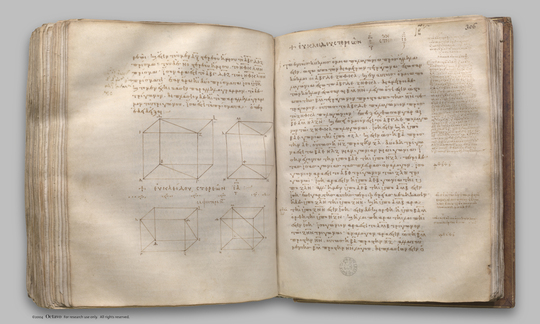index next | digilib folio 310

Similar polygons inscribed in circles are to one another as the squares on the diameters.
| Τὰ ἐν τοῖς κύκλοις ὅμοια πολύγωνα πρὸς ἄλληλά ἐστιν ὡς τὰ ἀπὸ τῶν διαμέτρων τετράγωνα. Ἔστωσαν κύκλοι οἱ ΑΒΓ, ΖΗΘ, καὶ ἐν αὐτοῖς ὅμοια πολύγωνα ἔστω τὰ ΑΒΓΔΕ, ΖΗΘΚΛ, διάμετροι δὲ τῶν κύκλων ἔστωσαν αἱ ΒΜ, ΗΝ: λέγω, ὅτι ἐστὶν ὡς τὸ ἀπὸ τῆς ΒΜ τετράγωνον πρὸς τὸ ἀπὸ τῆς ΗΝ τετράγωνον, οὕτως τὸ ΑΒΓΔΕ πολύγωνον πρὸς τὸ ΖΗΘΚΛ πολύγωνον. Ἐπεζεύχθωσαν γὰρ αἱ ΒΕ, ΑΜ, ΗΛ, ΖΝ. καὶ ἐπεὶ ὅμοιον τὸ ΑΒΓΔΕ πολύγωνον τῷ ΖΗΘΚΛ πολυγώνῳ, ἴση ἐστὶ καὶ ἡ ὑπὸ ΒΑΕ γωνία τῇ ὑπὸ ΗΖΛ, καί ἐστιν ὡς ἡ ΒΑ πρὸς τὴν ΑΕ, οὕτως ἡ ΗΖ πρὸς τὴν ΖΛ. δύο δὴ τρίγωνά ἐστι τὰ ΒΑΕ, ΗΖΛ μίαν γωνίαν μιᾷ γωνίᾳ ἴσην ἔχοντα τὴν ὑπὸ ΒΑΕ τῇ ὑπὸ ΗΖΛ, περὶ δὲ τὰς ἴσας γωνίας τὰς πλευρὰς ἀνάλογον: ἰσογώνιον ἄρα ἐστὶ τὸ ΑΒΕ τρίγωνον τῷ ΖΗΛ τριγώνῳ. ἴση ἄρα ἐστὶν ἡ ὑπὸ ΑΕΒ γωνία τῇ ὑπὸ ΖΛΗ. ἀλλ' ἡ μὲν ὑπὸ ΑΕΒ τῇ ὑπὸ ΑΜΒ ἐστιν ἴση: ἐπὶ γὰρ τῆς αὐτῆς περιφερείας βεβήκασιν: ἡ δὲ ὑπὸ ΖΛΗ τῇ ὑπὸ ΖΝΗ: καὶ ἡ ὑπὸ ΑΜΒ ἄρα τῇ ὑπὸ ΖΝΗ ἐστιν ἴση. ἔστι δὲ καὶ ὀρθὴ ἡ ὑπὸ ΒΑΜ ὀρθῇ τῇ ὑπὸ ΗΖΝ ἴση: καὶ ἡ λοιπὴ ἄρα τῇ λοιπῇ ἐστιν ἴση. ἰσογώνιον ἄρα ἐστὶ τὸ ΑΒΜ τρίγωνον τῷ ΖΗΝ τριγώνῳ. ἀνάλογον ἄρα ἐστὶν ὡς ἡ ΒΜ πρὸς τὴν ΗΝ, οὕτως ἡ ΒΑ πρὸς τὴν ΗΖ. ἀλλὰ τοῦ μὲν τῆς ΒΜ πρὸς τὴν ΗΝ λόγου διπλασίων ἐστὶν ὁ τοῦ ἀπὸ τῆς ΒΜ τετραγώνου πρὸς τὸ ἀπὸ τῆς ΗΝ τετράγωνον, τοῦ δὲ τῆς ΒΑ πρὸς τὴν ΗΖ διπλασίων ἐστὶν ὁ τοῦ ΑΒΓΔΕ πολυγώνου πρὸς τὸ ΖΗ ΘΚΛ πολύγωνον: καὶ ὡς ἄρα τὸ ἀπὸ τῆς ΒΜ τετράγωνον πρὸς τὸ ἀπὸ τῆς ΗΝ τετράγωνον, οὕτως τὸ ΑΒΓΔΕ πολύγωνον πρὸς τὸ ΖΗΘΚΛ πολύγωνον. Τὰ ἄρα ἐν τοῖς κύκλοις ὅμοια πολύγωνα πρὸς ἄλληλά ἐστιν ὡς τὰ ἀπὸ τῶν διαμέτρων τετράγωνα: ὅπερ ἔδει δεῖξαι. | Similar polygons inscribed in circles are to one another as the squares on the diameters. Let ABC, FGH be circles, let ABCDE, FGHKL be similar polygons inscribed in them, and let BM, GN be diameters of the circles; I say that, as the square on BM is to the square on GN, so is the polygon ABCDE to the polygon FGHKL. For let BE, AM, GL, FN be joined. Now, since the polygon ABCDE is similar to the polygon FGHKL, the angle BAE is equal to the angle GFL, and, as BA is to AE, so is GF to FL. [VI. Def. I] Thus BAE, GFL are two triangles which have one angle equal to one angle, namely the angle BAE to the angle GFL, and the sides about the equal angles proportional; therefore the triangle ABE is equiangular with the triangle FGL. [VI. 6] Therefore the angle AEB is equal to the angle FLG. But the angle AEB is equal to the angle AMB, for they stand on the same circumference; [III. 27] and the angle FLG to the angle FNG; therefore the angle AMB is also equal to the angle FNG. But the right angle BAM is also equal to the right angle GFN; [III. 31] therefore the remaining angle is equal to the remaining angle. [I. 32] Therefore the triangle ABM is equiangular with the triangle FGN. Therefore, proportionally, as BM is to GN, so is BA to GF. [VI. 4] But the ratio of the square on BM to the square on GN is duplicate of the ratio of BM to GN, and the ratio of the polygon ABCDE to the polygon FGHKL is duplicate of the ratio of BA to GF; [VI. 20] therefore also, as the square on BM is to the square on GN, so is the polygon ABCDE to the polygon FGHKL. |